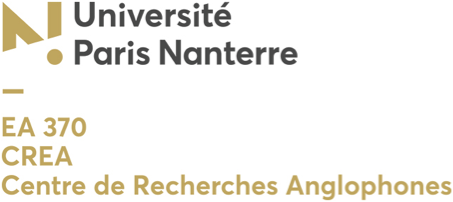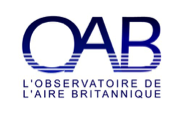- Appels à communication (recherche),
SOFEIR ANNUAL CONFERENCE " Strange Country – Ireland in politics and culture, 1998-2021"
Publié le 20 mars 2020
–
Mis à jour le 17 mai 2021

CFP / Appel à communications. Le colloque est organisé par le groupe de l’Observatoire de l’aire britannique (OAB), dans le cadre du projet transversal thématique " Les Nords " du Centre de Recherches Anglophones.
Date(s)
du 20 mai 2021 au 22 mai 2021
Date limite de candidature à l'appel à communications: 1er février 2021
Strange Country – Ireland in politics and culture, 1998-2021
SOFEIR annual conference,
Thursday 20, Friday 21 May 2021,
Université Paris Nanterre
SOFEIR annual conference,
Thursday 20, Friday 21 May 2021,
Université Paris Nanterre
PLEASE CHECK THE DEDICATED WEBSITE
https://sofeir21.parisnanterre.fr/
!! Due to the current pandemic restrictions, the conference will take place online!!
(Those who have already forwarded an abstract in response to the first “call for papers” do not have to make a second submission. They will be contacted by the organisers).
Please note the new dates and new organisation
- Online SOFEIR annual conference 20-21 May 2021
- Deadline for proposals 1st February 2021
- Notification of acceptance 10 March 2021
- Doctoral students are encouraged to submit proposals.
The organisers of the conference will oversee the publication of a volume, “Strange Country – Ireland in politics and culture, 1998-2021”, to be published at the end of 2021. Participants in the conference will be given details about the format and stylesheet for the volume.
1998 was a momentous year for Ireland, north and south. The Good Friday Agreement finally unlocked the Northern Ireland peace process, radically altering the relationships between Northern Ireland and the Republic and between the Republic and the UK. The acknowledgement that people born in Northern Ireland could identify both with the UK and with the Republic and hold both citizenships, coupled with the repeal of the 1920 Government of Ireland Act, symbolically ushered in a new vision of the island, just as the Republic was coming into its Celtic Tiger stride.
The Ireland entering the new millennium turned away from the bitter strife of the Troubles. It also left behind the economic underdevelopment and social and religious conservatism which had suffocated the independent Republic before the onset of the era of Celtic Tiger growth in the early 1990s. This decidedly transitional decade laid bare a profound shift in the Irish cultural and moral psyche, beginning with the exposure of the previously covered up scandals of sexual abuse within the Catholic Church, followed by the slim majority vote for constitutional change in the 1995 divorce referendum, culminating, two decades later, with the legalisation of same-sex civil partnership (2010), same-sex marriage (2015), and the partial legalisation of abortion (Health Act 2018).
A 21st century secularized Ireland presents to the world the image of an open society, in terms of individual freedoms. In parallel, the Republic has become the poster child for the hegemonic discourse of global free market economy and neoliberal worldviews: a tax-haven for GAFAs and US-based multinational companies, the Republic emerging from the 2008 economic collapse not with a critical appraisal of the policies that had led to the crisis but with a deliberate subservience to the EU-IMF bailout plan, putting forward an even more explicitly neoliberal agenda of austerity, in the face of the country’s growing economic inequalities, a dire housing, and the structural inequalities in the country’s job market. In this respect, Ireland would now appear to be a typical example of late capitalist post-modernity within the so-called Global North. It is this seemingly paradoxical situation, for a self-proclaimed post-colonial nation, that we wish to interrogate.
Our inspiration for this conference is Seamus Deane’s Strange Country: Modernity and Nationhood in Irish Writing Since 1790, published in 1997, a reflection on the persisting shadow cast over a possible modernity or normalisation of the country by an Irish gothic or undead. During the first two decades of the new century, the strange country has at times seemed stranger and stranger: an island of cosmopolitan global adaptation, from which the pall of clerical authority has miraculously lifted; a society of enlightened debate and constitutional renewal, as with the milestone referendums carried out in the Republic in 2015 and 2018, the first an extension of the constitutional rights relative to marriage, the second a Repeal of the 1983 8th amendment. A beacon of Europhile sanity and integration, in the context of Brexit Europhobia and xenophobia.
Such a tableau is no doubt a pious simplification. As always, the country is stranger than we might think, stranger than we might imagine or wish it to be. The unanticipated surge in support for Sinn Féin, from 2.5% in the 1997 election to 24,5% in February 2020, is evidence that the present and the future of Ireland are indeed surprising and strange. Or, alternatively, that Irish politics is now conforming to what is the new default mode of European and American unpredictability? This unpredictable strangeness of the present is certainly not particular or unique to Ireland. And perhaps to speak in terms of strangeness, when what is in evidence is really a case of the banal inequality in the intergenerational distribution of wealth and opportunity, is an unnecessary confusion of the issues now on the agenda, in Ireland and more generally.
The period 1998-2021, characterised by the extension of commodification and consumption, in a climate which was initially euphoric, but would later become more ambivalent, angrier and more jaundiced, against a growing sense of the severe challenges of climate crisis, and the ongoing confrontation with a historical and cultural heritage or memory, is thus worth examining, in relation to the politics, art, the culture of ordinary life of Ireland, north and south. As before, Ireland can be examined as the spectacular and instructive manifestation of an enduring singularity. And it can also be read as the instance of a more general predicament. Strange and also illuminating, precisely because it is a small and peripheral territory, a “readable” and interesting site for the exploration of the political and cultural condition of our common world, two decades into the 21st century.
Several issues can be examined through the prism of political and economic discourse, along with the practices of a 21st century Irish literary and artistic creation.
The following list of possible topics to be addressed is not exhaustive:
- Contemporary Irish literature and the arts (including cinema and television series), between a renewed appeal to regionalism and the lure of global English-speaking internationalism.
- Ireland and Brexit Britain, the country’s place within the EU, its positioning among the other former peripheries of the British Empire, the relationship with American cultural and economic imperialism, in the context of the county’s enduring Americanophilia.
- The Irish relationship to the normalizing discourses of neoliberalism, as a global “non-ideological” or “self-evident” worldview, distinct from a specifically
- British Thatcherism.
- Ireland’s stance on today’s environmental crisis and the global refugee crisis.
- The 2020 Irish General Election results and all subsequent events.
Please send your proposals to flore.coulouma@parisnanterre.fr, cornelius.crowley@parisnanterre.fr, florence.schneider@parisnanterre.fr
by February 1st, 2021 (notification of acceptance by March 10th, 2021).
Partenaires :





Mis à jour le 17 mai 2021
Fichier joint
- SOFEIR2021strange countryCFP 14 december.pdf PDF, 85 Ko
Modalités de candidatures au présent appel :
Please send your proposals to :
- flore.coulouma@parisnanterre.fr
- cornelius.crowley@parisnanterre.fr
- florence.schneider@parisnanterre.fr
- Submission deadline: February 1st, 2021.
- Notification of acceptance by March 10th, 2021.
- International conference May 20, 21, 2021.












